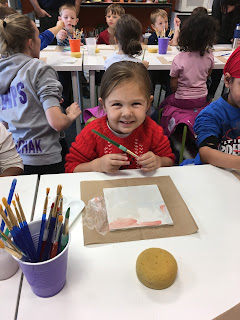Sorry for the delay! The month of October was full of opportunities
for learning with and from each other.
Check out some highlights of our learning below.
Belonging and Contributing: Identity day brought us the perfect
opportunity to demonstrate a sense of identity and positive self-image. Students had the opportunity to bring in a
picture or artifact that reflected who they are, or something they enjoy. The students talked proudly about what they
had brought in and respectfully listened to their peers in order to learn more
about the people they spend their days with. The students also really seemed to
enjoy sharing their artifacts with the adults who came to visit us, thank you
to everyone who attended!
Self-Regulation and Well-Being: We continued our
study of emotions and started using the Zones of Regulation to help us manage
our emotions. The students have been learning how to identify their own
emotions and move their name magnet into the various zones based on how they
are feeling (into the green zone when all is good, into the blue zone when they
are sad or tired, into the yellow zone if they are irritated or there is a
little problem and into the red zone when they are quite upset). We are still learning other emotions that may
put us into these zones, and students are beginning to be able to identify
strategies that will help move them from one zone to another (optimally, back
to green!). They also began learning
about big and little problems and are beginning to talk about the size of the
problem when they are upset.
This month also brought us the opportunity to
learn about safety! We had a couple fire
drills and a bus evacuation drill and we had many discussions about how to
handle situations like this if they ever happened for real. We learned that it is important to stay calm
and in control of our bodies (walking, listening, looking to trusted adults for
instructions or asking for help), in order to keep ourselves safe.
Literacy and Mathematics Behaviours: Oral communication is a big part of our leaning in Kindergarten. This month we learned new vocabulary such as French
colour words, fall vocabulary, Halloween vocabulary, and different ways to ask
for help, among other vocabulary, that can help us communicate in French. On a daily basis we talk about the letters we
see and the sounds that they make. We practise manipulating them in different
ways such as blending them together and pulling them apparat.
In math we continued to
work with the numbers one to ten. We played
math games such as dice games, measured our height using foam pumpkins and
compared them to the height of our friends, and used a pumpkin and various
materials to explore measurement of both height and girth. Using things such as cubes and strings to
measure the pumpkin, allowed us to build our fine motor skills as well by
connecting and breaking apart cubes, or when cutting the string. Our teachers
feel that incorporating fine motor activities into our learning is an important
part of our development as it prepares us for things like writing! We use our journals almost every day to draw
pictures, or to write words, messages or stories. The teachers regularly ask us to share our pictures
with them and to explain what we have made and why in order for us to practise
talking about our thinking.
Problem Solving and Innovating: The children’s
natural curiosity came into play a lot this month. Whether we were exploring the natural world
on a nature walk, or investigating gourds in our classroom, the students showed
that they were capable learners by questioning, observing and communicating about
what they saw. While exploring leaves,
students talked about what they saw, what they smelled and what their fingers
felt, in order to create a deep understanding of the similarities and
differences between the leaves. They
used the same skills to compare gourds in our classroom. They asked questions such as “Are those bumps
seeds?” and investigated to find out if their predictions were accurate or not.
A leaf snap app on the iPad and
pebblego.com are two tools we became familiar with this month. We used them to
answer some of our questions such as “What kind of leaf is this?” “What tree did
it come from?” and “Is seaweed a plant?”
As teachers we are proud that our students are beginning to ask questions
that we can investigate together. If
your child asks a question at home that may be of interest to others, we
encourage you to pass it along so that we can learn the answers together.








































